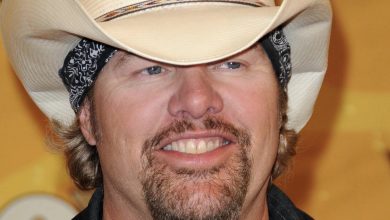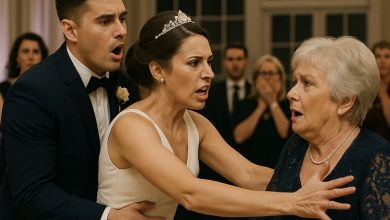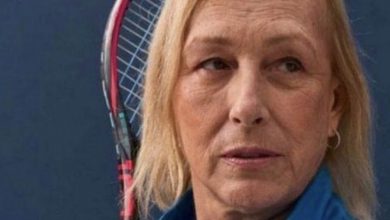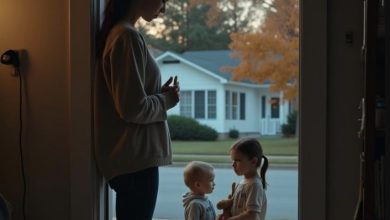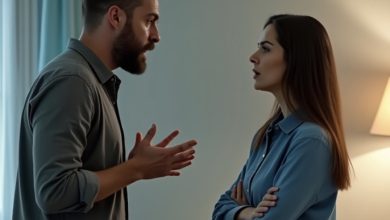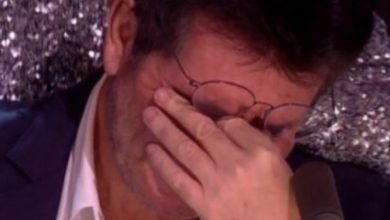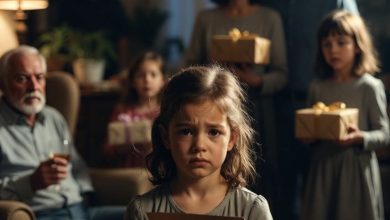The Key My Husband Left Behind Revealed a Hidden Truth
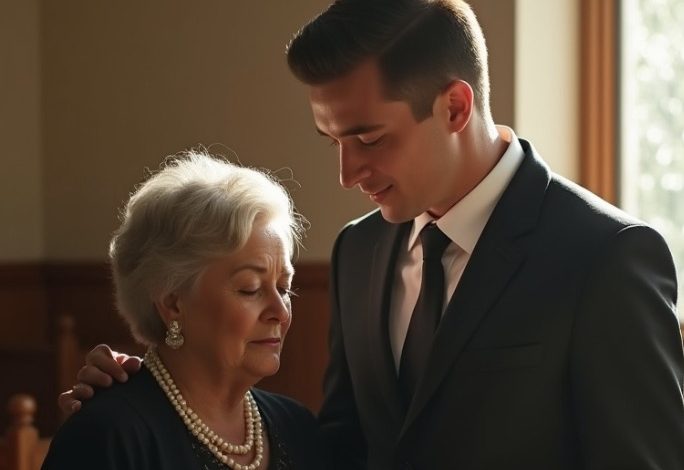
After my husband’s funeral, his brother handed me a sealed envelope with my name on it. Inside was a single brass key and a note that read: “Don’t trust your children. The truth is waiting…”
The funeral home was almost empty when Tom pressed the envelope into my shaking hands. The thick cream-colored paper felt heavier than it should, almost as if the weight of hidden truths lived inside it.
“Robert wanted you to have this,” Tom whispered. His eyes did not meet mine; instead, they darted nervously toward the door, where my children were speaking with the funeral director. “Open it when you’re alone.”
My husband of forty years had just been buried, and now his brother was delivering me secrets from beyond the grave. Tom’s fingers lingered on the envelope, hesitant to release it, as though letting go of it meant letting go of Robert all over again.
“Maggie,” he said quietly. There was a tremor in his voice that forced me to look at him. He had been crying, but behind the tears there was something else—fear, maybe even warning. “Just remember, Robert loved you more than anything.”
I held onto those words as I walked to my car. The parking lot was nearly deserted, with only a few scattered vehicles under the gray October sky. I sat in the driver’s seat, the silence pressing down on me. Through the windshield, I could see David helping Rachel with her coat, the big brother still protective, the sister leaning on him. They looked like any grieving children would look—sorrowful, heavy with loss.
My hands shook as I opened the envelope. The paper tore softly, the sound strangely loud in the quiet. Inside was a single brass key, old and solid, attached to a tag marked with the number 47 in Robert’s careful handwriting. And then, the letter.
My darling Maggie, it began, and instantly I could hear his voice. If you’re reading this, then I’m gone, and Tom has kept his promise. I need you to know that everything I’ve done has been to protect you. Don’t trust your children.
My heart seemed to stop.
I know how it sounds, but please, my love, trust me one last time. The truth is waiting in unit 47 at Henderson Storage on Maple Street. Tom has the code. What you find there will explain everything. I have seen how they dismiss you, how they make you feel small, as if you are less than the mother who raised them. You’ve always made excuses for them, my forgiving Maggie. But I saw what you refused to see. They don’t deserve you.
I looked up from the letter toward the funeral home. David was now scrolling on his phone, and Rachel was speaking animatedly into hers. Even here, on this day, they were handling business.
I’m sorry I couldn’t tell you while I was alive, Robert’s letter continued. I was afraid you’d confront them, give them a chance to twist the truth. You always wanted to believe the best in them. But now it’s time to see clearly. All my love forever, Robert.
The key bit into my palm as I clutched it. Forty years of marriage, two children, countless memories—and now this, a secret heavy enough to shatter everything I thought I knew.
Six months earlier, our Sunday dinners had been sacred. Robert would grill his famous ribeye, and the dining room would be filled with laughter and the smell of home. David always arrived first, punctual as ever, with a bouquet of yellow roses. “For the most beautiful woman in the room,” he’d say, kissing my cheek. Rachel came next with her husband, Martin, her arms loaded with desserts—though she always carried her homemade apple pie too. “Store-bought for backup, homemade for love,” she’d laugh.
Robert would take over the grill, Rachel and I would set the table with my grandmother’s china, and David would pour the wine, always serving me first. “Ladies before lawyers,” he’d joke.
At dinner, David entertained us with courtroom victories, Rachel shared stories from her marketing campaigns, and Robert sat glowing with pride, his hand squeezing mine under the table. These evenings felt like proof that all our sacrifices had been worth it. “We did good, didn’t we?” Robert would whisper as the children’s cars disappeared into the night.
“We did perfect,” I would reply, believing it with all my heart.
Then came the diagnosis: stage four pancreatic cancer. The words struck like a hammer. Robert held my hand so tightly in the doctor’s office that I thought my bones would crack. David and Rachel rushed in with determination, already discussing treatments and specialists. For a brief moment, I thought: We are a strong family. We’ll face this together.
But later that night, I found them in Robert’s study, hunched over his desk, whispering about his estate.
“The house alone is worth two million,” David muttered.
“The portfolio adds at least three more,” Rachel added, her pen scratching across a notepad. “And don’t forget Tahoe.”
They weren’t speaking of him as a father. They were dividing him like an estate sale before his body had even weakened.
When they noticed me, David smiled thinly. “Mom, we’re just preparing. You’re too emotional. Let us handle the details.” His words cut deep, but I told myself it was grief speaking.
As Robert’s health declined, their distance grew—not from him, but from me. Nurses began directing questions to David instead of me. Rachel spoke of me on the phone as if I weren’t capable, calling me fragile, overwhelmed, lost.
One day, I carried up Robert’s favorite soup, only to overhear Rachel’s voice in the hallway. “Martin, Mom’s falling apart. She’s wasting time cooking instead of doing anything useful. Thank God David and I are taking care of the important things.”
I froze with the bowl in my hands. Later, when Robert whispered, “Good soup, Maggie. Tastes like home,” I forced myself to smile, then cried silently in the bathroom.
At the hospice meeting, David placed his hand firmly over mine. “Let me handle this, Mom,” he said to the staff. “She’s overwhelmed.” Rachel chimed in: “Mom’s too emotional to make these choices.”
When I protested, David accused me of forgetting Robert’s medications. My explanations fell flat. That night, they presented me with papers to sign. My hand trembled as I gave away my right to decide for the man I had loved my whole life.
The funeral ended, and the house became unbearably empty. I clung to Robert’s flannel shirt, his scent fading with each day. David claimed Robert’s watches, Rachel boxed his books. In the garage, I discovered his entire workshop stripped bare. They had erased even his tools, his projects, his memories.
I collapsed on the cold concrete floor, sobbing, until I noticed a photograph—our wedding photo, hidden behind where the tool chest had stood. We looked so young, so sure we could face the world together.
Three nights later, at two in the morning, I drove to Henderson Storage with the key. Unit 47 opened, the overhead light flickering on. What I saw made me gasp.
It was our life, preserved.
The first box held our wedding china, which I thought we had sold for David’s tuition. Robert’s note read: You cried that night. I couldn’t let them go. Another box contained my mother’s jewelry—pieces Rachel had claimed were lost. Each one wrapped carefully, each tagged with Robert’s handwriting: Rachel said these were dated. They’re timeless, like you.
Then came the folder marked TRUTH. Inside were bank statements for an account in my name only. Robert had been funding it quietly for fifteen years. Maggie’s freedom, the notes read. The balance was enough for me to live independently, without asking anyone for help again.
Behind the statements, more letters. Robert had written down every insult, every dismissal I had brushed aside. David called you “just a teacher.” I have never been prouder of your career. Rachel called you “simple.” She doesn’t understand wisdom. You knew what mattered.
Finally, copies of emails between David and Rachel: Mom’s going to fall apart. We need everything in our names now. David’s reply chilled me: Already working on it. Dad’s too sick to notice, and Mom will sign anything.
The grief stabbed, but beneath it rose something else: strength. Robert had left me proof. Proof that I was not weak. Proof that I mattered.
I called Tom. “I found everything,” I whispered.
“Good,” he said. “What will you do now?”
For the first time in months, I knew the answer. “Take my life back.”
I pretended to be the fragile widow. I nodded when Rachel suggested assisted living. I hummed in agreement when David mentioned settling the estate. Behind the scenes, I met with James Chen, a lawyer Tom trusted. Robert had transferred everything into an irrevocable trust: The Margaret Whitmore Living Trust. I was in full control.
When David spoke of declaring me incompetent, I recorded him. When Rachel brought papers for power of attorney, I photographed them before signing with a shaky, deliberate hand. They thought my silence was surrender. In truth, it was preparation.
At the estate reading, Tom revealed the truth. Robert had recorded a video, explaining why he created the trust. My children’s faces drained of color as Robert’s voice filled the room, accusing them of trying to strip me of dignity.
I confronted them, calm and steady. “Your father knew who you had become. He saw you erase me. And he left proof.”
Their last hope was in separate envelopes. They opened them, only to discover Robert’s final lesson: volunteer work, essays on respect for teachers, hours spent in classrooms before receiving anything.
“That’s it?” David asked, devastated.
“That’s everything,” I told him.
Now, three months later, I stand in Robert’s restored workshop. His unfinished jewelry box sits on the bench. I run my fingers over the wood, knowing his greatest gift was not the money but the way he saw me when everyone else refused to.
The Whitmore House for Educators opens next month, offering retired teachers a place of dignity. David is doing his volunteer hours at the school, confused but changing. Rachel’s essays, though painful, are slowly blooming into truth.
I keep Robert’s last letter in the jewelry box I finished myself. Maggie, you were never “just anything.” You were everything. Don’t let them make you small. You are the biggest thing that ever happened to me.
As the afternoon light warms the workshop, I breathe deeply. I am not the erased woman anymore. I am not even the widow who fought back. I am Maggie—the woman who finally remembered who she always was.


